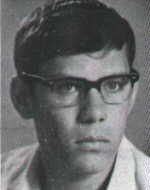Cohen, Eliezer (“Eliko”)
Son of Yitzhak and Adina. He was born on the 17th of Adar 5731 (March 6, 1950) in Haifa, to his mother and father – a judge of the Supreme Court. He spent his childhood and youth in a peaceful environment and grew up as a healthy, cheerful, intelligent and talented child. He attended elementary and high school at the Reali School in Haifa. He was a good student and took part in social activities. For several years he was head of the committee in his class and served as secretary of the executive committee and its chairman. Eliezer was the conscience of the class and the voice of conscience dictated his steps, when he did not hesitate to express his opinions quietly, even contrary to the opinion of his friends. He loved the truth, aspired to justice, was moderate in his ways and loved people. Thanks to this, he was loved and loved by all his teachers, friends and apprentices. He was a devoted member of the Scouts movement, served for three years as a counselor and was active in the movement’s institutions. He liked to go hiking around the country and was connected to his homeland, which he gave his life after. He had a great deal of strength in company studies and he planned to attend law school when he reached the university. But he chose the real trend in school because of the high level of education and because of the challenge involved. His annual work during his last year of school, on the subject of “the criminal responsibility of the mentally ill,” won the mark. Eliezer was drafted into the IDF in August 1968. After basic training, he served at the Armored Corps reconnaissance unit during his service at various locations in the Sinai desert, near the Suez Canal and on the banks of the Gulf of Suez. His death while fulfilling his duties. Owners rode a mine in the Gulf of Suez area. He was laid to rest in the military cemetery in Haifa. At the funeral, thousands participated, and his commander eulogized him by praising Eliezer and his behavior, without ostentation and without loud argument: “It was said that the army was not educated, not for war, because it was contrary to its character and will, But Eliezer saw one thing, that we, the Jewish people who have been fighting for thousands of years, have no choice and out of full recognition, despite the psychological difficulties, went out and carried out every mission: he would stand up to the difficulties and the dangerous ones and the gray daily life, He never uttered a word of irritation, and within a week the comrades had gone to arms with three of their friends They will be remembered forever, for they are the precious price of this people’s life and the hope of their future, their bodies have become extinct but their bodies have been cleansed, shaken, and they shine in our hearts a great light, a light of pride, of hope. ” In a letter of condolence to the family, on behalf of his comrades-in-arms, the commander of his unit wrote: “A tzaddik – that’s what we called him – a kind of aura of innocence and pure mission hovering over him. I saw that he hated the war, but I felt well that he knew his mission, and that the quiet, pure, full of love of nature and the world, and even his Arab enemies did not enjoy his hatred, for he never knew hatred and evil. As a son of this persecuted people for thousands of years he said this time: “No! And his soul gave for this truth, and it burns like a great fire that illuminates us.”
